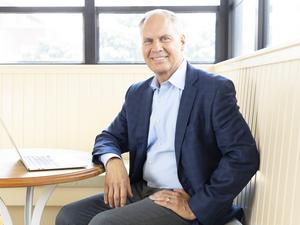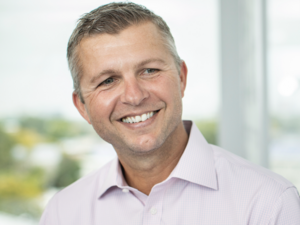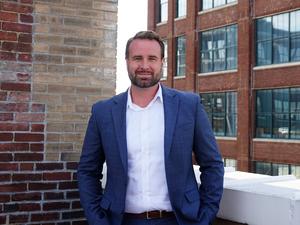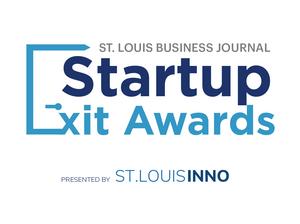Startup Exit Awards: Exits of the Year - Benson Hill and Nerdy
Benson Hill and Nerdy didn’t begin with ambitions of becoming public companies. They started in hopes of providing solutions.
Chuck Cohn founded Nerdy (NYSE: NRDY) in 2007 as an in-home tutoring business after struggling to find a tutor for help while studying at Washington University. Benson Hill (NYSE: BHIL) began in 2012 to commercialize research out of the Donald Danforth Plant Science Center focused on improving crop yields.
Today, the scope of each company has vastly expanded. Nerdy, the Clayton-based parent company of Varsity Tutors, offers an array of online tutoring tools for everything from online instruction to self-study. Benson Hill, based in Creve Coeur, has emerged as a food technology company focused on commercializing plant-based ingredients and fresh produce.
In September 2021, Nerdy and Benson Hill each debuted on the New York Stock Exchange after completing mergers with special purpose acquisition companies (SPACs). The deals minted the two firms as so-called "unicorns" — private companies with valuations north of $1 billion — and were celebrated as massive wins for the St. Louis startup economy and the local investors and institutions that supported them.
Yet in the months since their public market debuts, Nerdy and Benson Hill have received tepid interest from investors, with each firm’s share price dropping considerably: Benson Hill shares are down 68% from IPO, while Nerdy's has fallen 78% Despite that, the CEOs of each company say they wouldn't change their decisions to become publicly traded firms, confident that they are executing on strategies that will drive longterm growth to attract investors.
As the Exits of the Year winners for St. Louis Inno’s Startup Exit Awards, we caught up with Benson Hill co-founder and CEO Matt Crisp and Cohn, Nerdy’s founder, chairman and CEO, in a joint interview to discuss their respective journeys toward public markets, what the IPO experience was like for each of them and why they have no regrets over how it all turned out.
TURNING THE CORNER
Chuck Cohn can still remember a key moment when he knew he was onto something with his nascent tutoring business. He was inside Washington University’s student union collecting payment from his company’s tutors for recent tutoring assignments.
“There was a line of tutors that were handing me cash and checks and I was writing it down in this little journal, like Joe gave me $150, I owe him X. I was starting to lose track of everything and realizing like, wait a second. There's actually like a real business here. I need to figure out how to scale it and invest in technology, but there's clearly some sort of product market fit,” Cohn said.
While Nerdy and Benson Hill have grown into publicly traded companies with hundreds of staff, they were fledging in their early days, unsure if they’d last.
“There were definitely very stressful moments early on where we didn't know if we were going to be able to form the capital that was required to validate the technology and, and, you know, essentially continue operations,” Crisp said.
Each company, though, had their breakthrough moments that signaled they’d find sustainability. Cohn recalls when Nerdy realized it’d be able to transition from an in-person tutoring company to an online learning firm in 2013 once software that enabled real-time online calls hit the market. Nerdy didn’t hesitate to act.
“The day that it became available, we started playing around with it and built a minimum viable product that wasn't very good, but it was such a 'wow' moment,” Cohn said.
A year later, Nerdy launched its first live learning platform and now provides all of its tutoring services digitally.
At Benson Hill, Crisp says an inflection point came in 2018 when the company raised its $60 million Series C funding round, which was led by GV, the venture arm of Google’s parent company Alphabet Inc. The deal marked the first time Benson Hill sought funding to focus on something other than developing the technology. Now it could expand its work to commercializing it.
“That ignited a path that brought to bear the outputs of the technology and the innovation in markets with real customers and real products and real revenues. That was a really big turning point for a lot of us here,” Crisp said.
In the years to follow, Benson Hill would execute on that commercial strategy, launching business units focused on ingredients and produce production and purchasing infrastructure, including a soybean crushing facility in Indiana and a manufacturer of food-grade soy products in Iowa.
THE ST. LOUIS ADVANTAGE
While both are headquartered in St. Louis, Nerdy and Benson Hill took different routes to calling the region home. Cohn kept his company located in his hometown of St. Louis after finishing up his studies at Washington University. Initially based out of Research Triangle Park in North Carolina, Benson Hill relocated its headquarters to St. Louis.
Over the years, Nerdy and Benson Hill have expanded with locations and employees in other states, but Crisp and Cohn said St. Louis has been a major component to their ability to reach exits.
Benson Hill has been able to rely on St. Louis agriculture talent base, pulling employees with experience at companies like Bayer Crop Science, and was able to validate its technology using infrastructure at the Danforth Center.
“We were able to punch above our weight class early on, because we had access to that,” Crisp said,
Surprisingly, Nerdy also got an assist early on from Bayer (formerly Monsanto), due to former Monsanto CEO Richard Mahoney’s role as an executive in residence at Washington University’s Olin Business School, where he advised students on business ideas.
“I was 21 years old and just showed up to the office one day and was able to meet with the world famous CEO of Monsanto to talk about my little business idea and get suggestions a couple of different times. It was a pretty cool and humbling experience,” Cohn said.
Nerdy’s origins at Washington University gave access to other resources. For example, shortly after founding Nerdy, Cohn attended a legal resources seminar and met Chris Swenson, then an attorney for law firm Polsinelli. Today, Swenson is Nerdy’s chief legal officer and corporate secretary.
Local investors have also been critical to the two startups. Benson Hill’s seed funding round was led by Missouri Technology Corp. and BioGenerator, which helped complete due diligence on the company to lure other investors in the agtech firm’s early days. In 2015, Nerdy raised $7 million from David Karandish and Chris Sims, former executives of Answers Corp., a local startup that had a $900 million exit in 2014.
“They also committed to taking a weekly call with me to provide mentorship and guidance, which was immensely valuable,” Cohn said.
‘NO REGRETS’
For both Benson Hill and Nerdy, it wasn’t a matter of if they would go public, but when.
When Nerdy in 2015 raised its first venture funding from institutional investors, Cohn knew it intended to pursue the public market. That shaped the direction of the edtech startup.
“It causes you to maybe think a little bit differently about the type of team and company that you're building,” Cohn said.
As Benson Hill grew, Crisp said the startup knew an M&A deal was an unlikely exit, based on the commercial strategy it was building. In 2019, it formed a committee to assess its public market readiness. What it didn’t expect at the time was to eschew a traditional initial public offering. But as Benson Hill received in-bound interest from SPACs, it sped up its path to the public markets.
“We, as a board, decided that while our plans originally didn't estimate our willingness or preparedness until 2022 that we could execute that transaction and actually had what we needed to go out in 2021,” he said.
Cohn says Nerdy realized in 2020 it had the pieces in place to act on its ambition to go public, with a path to profitability, a solid management team and an expanded product portfolio.
“We were checking green check marks all the way down the list and that's what gave us the confidence to decide that now is the time to go public,” Cohn said.
While lauded as a major celebration of St. Louis’ startup economy, Benson Hill and Nerdy have so far encountered a cool reception from investors. Each company listed initially at $10 per share. As of trading on July 20, Benson Hill and Nerdy shares had a value of $3.05 and $2.27, respectively.
That comes as investors have shied away from companies that used SPACs as a vehicle to go public, with many of experiencing significant drops in their share prices. Unlike traditional IPOs, SPACs start as shell companies set up by investors to raise money through an IPO for use in acquiring a privately held company.
Both Crisp and Cohen suggest that the market's cool reaction to SPAC companies as a whole isn't necessarily an indicator of their strength of their businesses individually.
Cohn said the fact that SPAC companies are essentially trading as one, big asset class "makes absolutely no sense whatsoever."
“While volatile, the markets are unfriendly in a manner that's not discriminate against any one business, frankly," Crisp said.
Meanwhile, while still operating with losses, Benson Hill and Nerdy have each reported revenue gains in recent months. Benson Hill said it had 191% revenue growth in the first quarter of 2022. It projects full-year 2022 revenue of between $315 million to $350 million, up from $147.2 million million in 2021.
Nerdy in May said it had record revenue of $46.9 million in the first quarter, up 36% year over year. It lowered its revenue guidance for the second quarter, but said that move comes as it implements a new subscription model for its tutoring services that it expects to improve revenue over time. It anticipates 2022 revenue of between $160 million and $175 million, up from $140.7 million 2021.
While the two firms are both navigating market volatility, Crisp and Cohn say they wouldn’t change their decision to take their companies public.
“I have no regrets about going out,” Crisp said. “I think it was the right move for the business. Frankly, I don't think we'd have done anything different if I look back. I'm thrilled with the progress of the business. I'm very proud of the team and the execution."
While the current volatility may be cause for frustration for the two companies, both CEOs say they are more focused on the future of their companies, rather than today’s share price.
"If you have a long term orientation, it doesn't matter, and we just need to go out and continue to execute,” he said.
More about the businesses
NERDY
The business: Founded in 2007, Nerdy offers an array of online tutoring tools for everything from online instruction to self-study. In addition to offering individual tutoring for students, it operates Varsity Tutors for Schools, a collection of products designed for school districts.
CEO: Chuck Cohn
Headquarters: Clayton
Employees: Approximately 1,000 full and part-time employees
IPO date: September 21, 2021
Annual revenue: In 2021, Nerdy had revenue of $140.7 million. It projects annual revenue between between $160 million and $175 million in fiscal 2022.
BENSON HILL
The business: Founded in 2012, Benson Hill has developed technology, called CropOS, that uses data science, artificial intelligence and machine learning to help improve crop varieties with better accuracy, nutritional value and sustainability than traditional breeding methods. Its two major business units are its ingredients division, which develops and commercializes ingredients for the plant-based foods and animal feed markets, and its fresh segment focused on producing healthier produce.
CEO: Matt Crisp
Headquarters: Creve Coeur
Employees: 468
IPO date: September 30, 2021
Annual revenue: Benson Hill projects full-year 2022 revenue of between $315 million to $350 million, up from $147.2 million million in 2021.
For links to profiles of winners and finalists in the 2022 Fire Awards and Startup Exit Awards, go here:












